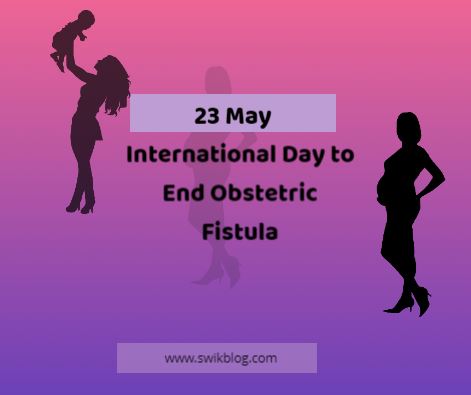International Day to End Obstetric Fistula is a United Nations Observance celebrated annually on May 23 to promote progress in the field of obstetric fistula care and prevention. It is a disease that many girls and women in developed countries. This day is celebrated to raise awareness about obstetric Fistula and mobilize support around the globe.
It is a global campaign to eliminate and end fistula also to re-establish the health of people affected has been initiated in the United Nations Populations Fund (UNFPA) and their collaborators in 2003. In 2012, the UN declared that every year on May 23 it will observe as International Day to End Obstetric Fistula.
About Obstetric Fistula
Obstetric fistula is a major childbirth complication which causes a woman to be injured and disabled. It is a kind of hole between the birth canal and the bladder or rectum, caused by long-term obstruction and causes infection, incontinence and even death if left untreated. Women with obstetric fistula suffer from physically and mentally discomfort, social isolation, rejection and shame. Over two million women worldwide are affected by fistula, especially in Sub-Saharan Africa and Asia.
The current COVID-19 pandemic could threaten the battle to end obstetric fistula, one of the most severe and devastating injuries that can happen during childbirth.
Theme
International Day to End Obstetric Fistula 2020 Theme: “End gender inequality! End health inequities! End Fistula now!”
This year’s theme highlights a strong message: “End gender discrimination! End health inequities! Stop Fistula now!.” Before the pandemic, the girls and women are at risk of living with fistula faced structural and systemic barriers to caring. Whilst the global health systems battle to fix the COVID-19 response, there is a risk of de-escalating sexual and reproductive health services. Denial or lack of access for women and young children, who are already facing economic, social, cultural, and logistic barriers, is especially devastating.
The pandemic strengthens pre-existing inequalities (including gender inequalities), revealing gaps in social and economic structures which gives an extremes pandemic impact.
Despite the continuing war against the COVID-19 pandemic, efforts will continue to end the fistula. Priority should be given to ensuring comprehensive, high-quality maternal health care, including adequately trained midwives and fistula surgeons for the women who have already been affected. During pandemics, close attention should be paid to fistula prevention, diagnosis and follow-up services.
An estimated 2 million women are living with this injury in sub-Saharan Africa, Asia, the Arab region, and Latin America and the Caribbean and some 50,000 to 100,000 new cases are emerging each year. Yet fistula can be prevented approximately completely. It is a symptom of the inability of health services to meet the basic needs of women.
Swikriti Dandotia












Nice blog… Very nicely explained !!
Visit Pregnancy Month 3 Symptoms and Its Care.